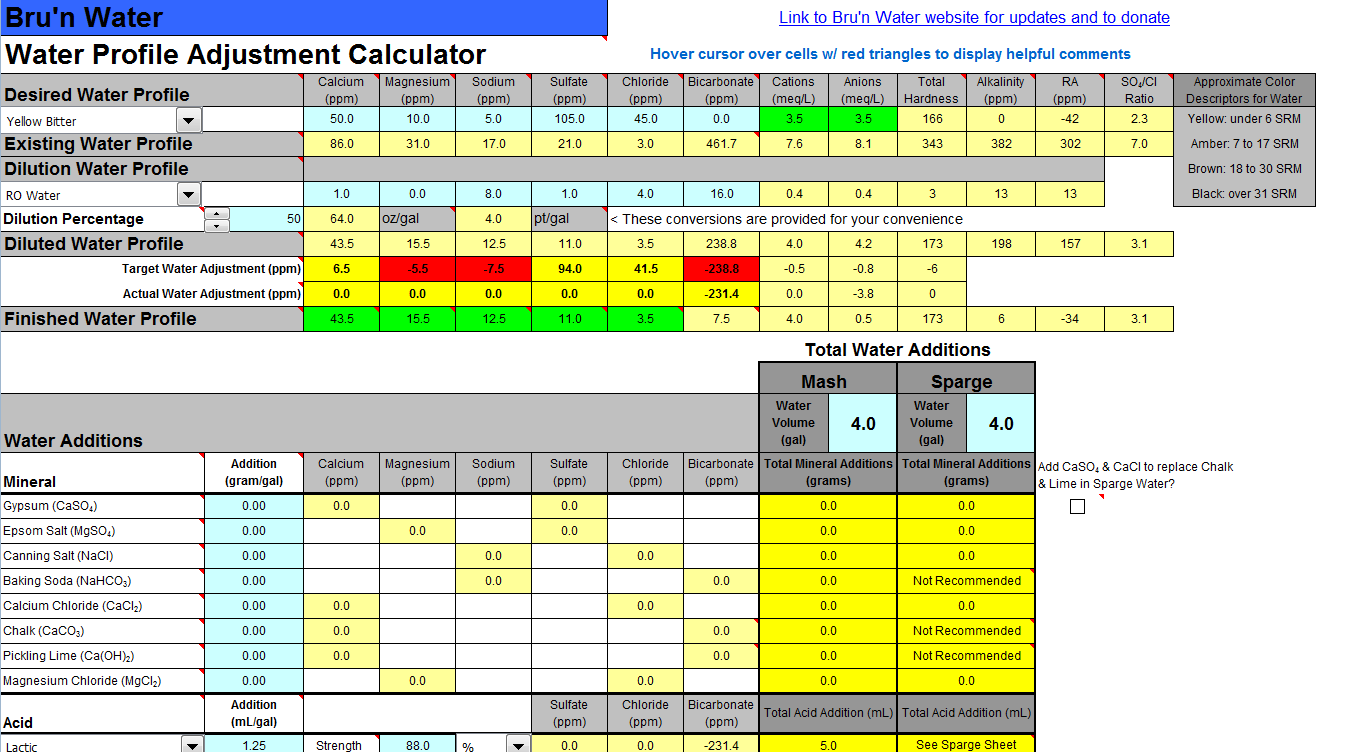Below are my tap (well) water test results.
I've entered these values in the Bru'n Water excel book. Based on this (if I understand correctly <<< which may be highly unlikely), it seems like if I use 50/50 RO and tap water, my strike water will be pretty close to good... (looking for a balanced result for IPAs mostly right now). In any case, if I understand, I'll be closer to good.
It may be worth noting that I'm pretty confused about all the facets here and what exactly I'm trying to achieve (aside from a good tasting brew). My finished results to date have been enjoyable... just trying to improve.
I also note, the Bru'n Water seems to suggest I should add some acid to my strike water. I tested PH on the one all grain batch I did. I took a sample shortly before the end of the mash and let it cool. PH was about 6.6 (exactly what Bru'n Water predicted... so maybe I'm on the right track)... So, I guess I need to add some acid to the strike water.
So, without further adieu. Here are my results... Any thoughts/suggestions/opinions/etc would be appreciated.
pH 7.7
Total Dissolved Solids (TDS) Est, ppm 402
Electrical Conductivity, mmho/cm 0.67
Cations / Anions, me/L 7.6 / 8.1
ppm
Sodium, Na 17
Potassium, K 1
Calcium, Ca 86
Magnesium, Mg 31
Total Hardness, CaCO3 344
Nitrate, NO3-N 0.1 (SAFE)
Sulfate, SO4-S 7
Chloride, Cl 3
Carbonate, CO3 < 1.0
Bicarbonate, HCO3 461
Total Alkalinity, CaCO3 380
Total Phosphorus, P 0.13
Total Iron, Fe 2.51
I've entered these values in the Bru'n Water excel book. Based on this (if I understand correctly <<< which may be highly unlikely), it seems like if I use 50/50 RO and tap water, my strike water will be pretty close to good... (looking for a balanced result for IPAs mostly right now). In any case, if I understand, I'll be closer to good.
It may be worth noting that I'm pretty confused about all the facets here and what exactly I'm trying to achieve (aside from a good tasting brew). My finished results to date have been enjoyable... just trying to improve.
I also note, the Bru'n Water seems to suggest I should add some acid to my strike water. I tested PH on the one all grain batch I did. I took a sample shortly before the end of the mash and let it cool. PH was about 6.6 (exactly what Bru'n Water predicted... so maybe I'm on the right track)... So, I guess I need to add some acid to the strike water.
So, without further adieu. Here are my results... Any thoughts/suggestions/opinions/etc would be appreciated.
pH 7.7
Total Dissolved Solids (TDS) Est, ppm 402
Electrical Conductivity, mmho/cm 0.67
Cations / Anions, me/L 7.6 / 8.1
ppm
Sodium, Na 17
Potassium, K 1
Calcium, Ca 86
Magnesium, Mg 31
Total Hardness, CaCO3 344
Nitrate, NO3-N 0.1 (SAFE)
Sulfate, SO4-S 7
Chloride, Cl 3
Carbonate, CO3 < 1.0
Bicarbonate, HCO3 461
Total Alkalinity, CaCO3 380
Total Phosphorus, P 0.13
Total Iron, Fe 2.51




